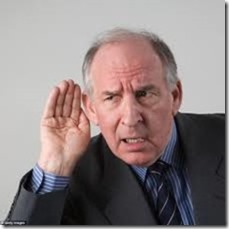 It always surprises me when new information about the aging process comes my way and a previously puzzling situation suddenly makes sense.
It always surprises me when new information about the aging process comes my way and a previously puzzling situation suddenly makes sense.
I call it the “aha” moment.
This week’s “aha” moment, which involved my father-in-law, occurred as I read an article titled “Hearing Loss, Undiagnosed and Undertreated,” in a journal called Today’s Geriatric Medicine.
I met my husband’s father, Danny, when he was about 65 years old. He was lovely man, a kind soul whom I grew to love dearly.
Upon meeting him, the first thing that would strike you about Danny was his love for cigars. He always has a cigar in this mouth. He’d been a cigar smoker for many years. My husband tells me his childhood winters in New Jersey were brutal—not because of the weather, but because the house was sealed tight and cigar smoke filled every room.
The other thing that was obvious about Danny was his hearing loss. His speech patterns were off, the volume on his TV set and car radio was very loud, and he hearing aids in both ears.
He called me Andrew, not Andrea. I think this was because he could not hear the unaccented “ea” sounds when people spoke my name.
Danny’s hearing loss was profound, and without his hearing aids he was almost deaf.
Later in his life, Danny was diagnosed with dementia. By the time he was diagnosed, his dementia was pretty advanced.
Not long after his diagnosis, he moved to a Memory Care Unit at an Assisted Living Facility.
Memory loss made it difficult for him to remember to put in his hearing aids, and later it made it hard to keep track of them.
After his hearing aids were lost, it became increasingly difficult for the Memory Care staff to communicate with Danny and impossible for my husband and me to talk to him on the phone once we moved to California. That was a tremendous loss for my husband.
The journal article I was reading cited research that smokers are nearly two times more likely to experience hearing loss than nonsmokers and that the longer people smoked and the more they smoked, the greater the hearing damage.
Could it be that Danny’s cigar smoking had something to do with his hearing loss?
The article also referred to a recent study completed at Johns Hopkins Medical Center that found people with untreated hearing loss have a greater risk of developing dementia than do individuals with no hearing loss.
The study showed that participants with hearing loss had a 40 percent greater chance of cognitive decline compared with those who had normal hearing at the beginning of the study.
Dementia and hearing impairment share several overlapping symptoms, including social isolation, decreased comprehension, inappropriate word use and difficulty following conversation.
Could it be that Danny’s hearing loss had something to do with his dementia diagnosis or, at the very least, that it took us longer to diagnose the dementia because of those overlapping symptoms?
The article stated that when audiologists (healthcare professionals who evaluate, diagnose, treat and manage hearing loss) fit hearing aids in patients diagnosed with Alzheimer’s, the patients’ communication skills improved, their behavioral problems decreased significantly and their caregivers’ stress was reduced.
Could it be that Danny’s untreated hearing loss (once he lost his hearing aids in the facility) impacted him socially and mentally and hastened the progress of his dementia?
We will never know the answers to those questions, but it certainly has me thinking about how we might have advocated for Danny’s health and well-being by bringing in a certified audiologist to conduct a hearing evaluation and fit him with new hearing aids.
I need to share one more story on the topic of hearing.
When my husband and I were first married, I complained that my husband was not hearing what I was saying. I insisted he get his hearing checked. The doctor asked Peter why he’d come in for the test and he explained that his wife had said he was not hearing her.
After the doctor was finished testing, he proclaimed, “Your hearing is fine; what you have is called marriage.”




